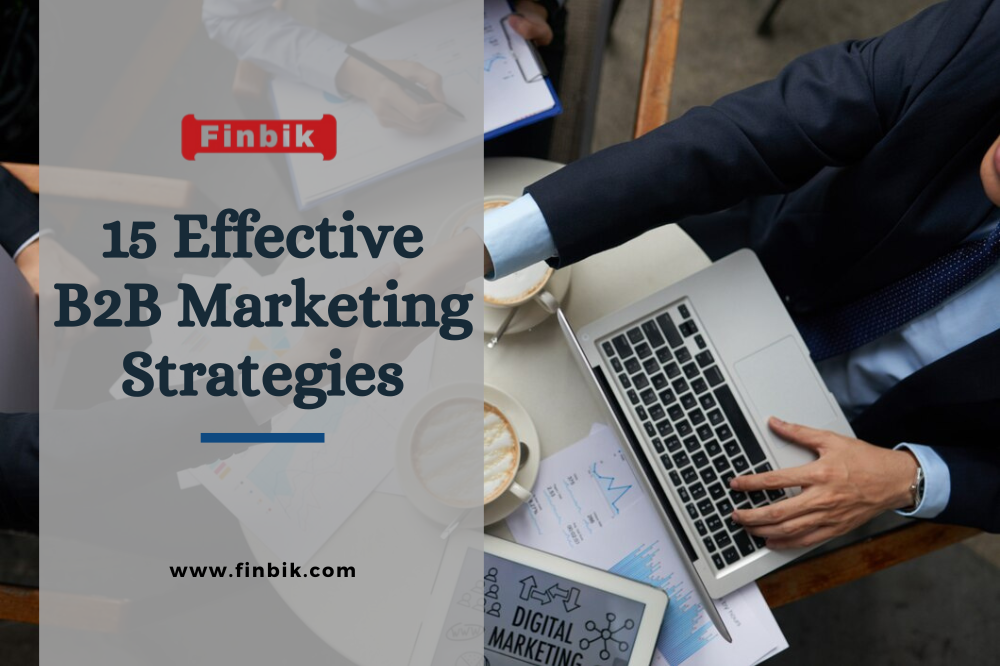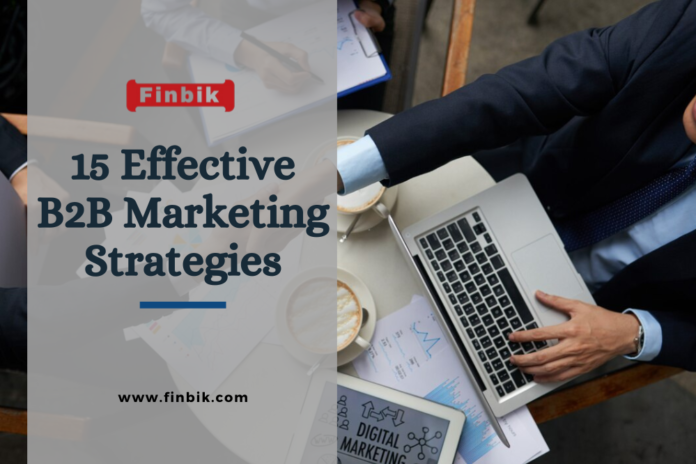Business-to-business (B2B) marketing is a unique landscape that requires tailored strategies to reach and engage other businesses. To thrive in this competitive arena, organizations must adopt effective B2B marketing strategies. In this article, we’ll explore 15 proven strategies to enhance your B2B marketing efforts.
Table Of Content
15 Effective B2B Marketing Strategies
- Content Marketing
- Social Media Advertising
- Email Marketing
- Search Engine Optimization (SEO)
- Account-Based Marketing (ABM)
- Influencer Marketing
- Webinars and Virtual Events
- Video Marketing
- Data-Driven Marketing
- Marketing Automation
- Partnerships and Alliances
- Case Studies and Testimonials
- Personalization
- Industry-Specific Events
- Customer Relationship Management (CRM
What are the 7 P’s of B2B Marketing?
What could be the most effective channels and strategies for B2B marketing?
Why is B2B marketing effective?
15 Effective B2B Marketing Strategies

1. Content Marketing
Strategy: Create valuable, informative content that addresses your target audience’s pain points and challenges. This can include blog posts, whitepapers, ebooks, and more.
Example: A cloud-based software provider publishes a series of blog posts explaining common industry challenges and how their product can solve them.
2. Social Media Advertising
Strategy: Utilize platforms like LinkedIn and Twitter for targeted advertising to reach B2B decision-makers.
Example: An IT consulting firm runs a LinkedIn advertising campaign to promote its cyber security services, specifically targeting IT managers and executives.
3. Email Marketing
Strategy: Craft personalized and relevant email campaigns to nurture leads and build lasting relationships.
Example: A marketing automation company sends out a series of emails to a lead who downloaded a whitepaper, providing more in-depth information and eventually offering a free trial.
4. Search Engine Optimization (SEO)
Strategy: Optimize your website and content to rank higher on search engines, increasing organic traffic.
Example: An online marketing agency optimizes its blog posts for relevant keywords, leading to increased organic traffic and more qualified leads.
5. Account-Based Marketing (ABM)
Strategy: Focus on high-value accounts by delivering personalized content and experiences.
Example: A B2B SaaS provider tailors its messaging and content to target key accounts, offering solutions specific to their needs.
6. Influencer Marketing
Strategy: Collaborate with industry influencers to boost your brand’s credibility and reach.
Example: A logistics software company partners with a renowned supply chain expert to co-create content and promote it to their shared audience.
7. Webinars and Virtual Events
Strategy: Host webinars and virtual events to engage prospects and showcase your expertise.
Example: A pharmaceutical company conducts a webinar to discuss the latest industry trends and the potential impact on supply chain management.
8. Video Marketing
Strategy: Create engaging and informative videos to convey complex messages effectively.
Example: An industrial equipment manufacturer produces video tutorials on the proper use and maintenance of their machinery, reducing customer support inquiries.
9. Data-Driven Marketing
Strategy: Leverage data and analytics to make informed marketing decisions.
Example: A market research firm uses data analytics to identify emerging market trends, helping their clients make informed decisions about product development and marketing strategies.
10. Marketing Automation
Strategy: Use tools for lead nurturing, scoring, and efficient campaign management.
Example: A software company automates lead nurturing, sending customized emails based on a lead’s behavior, leading to increased conversions.
11. Partnerships and Alliances
Strategy: Forge strategic partnerships to expand your reach and offer complementary services.
Example: An IT services provider forms a partnership with a cybersecurity firm to enhance their service offerings and cross-promote to each other’s clients.
12. Case Studies and Testimonials
Strategy: Showcase success stories and testimonials to build trust and credibility.
Example: A logistics company features case studies of successful supply chain optimization projects, demonstrating their expertise to potential clients.
13. Personalization
Strategy: Tailor your marketing efforts to individual needs and preferences.
Example: A marketing agency personalizes email content based on a recipient’s industry and past interactions with the company.
14. Industry-Specific Events
Strategy: Participate in and sponsor industry events and conferences to network and gain exposure.
Example: A medical device manufacturer exhibits at a major healthcare conference to showcase their latest products and connect with potential buyers.
Strategy: Implement a CRM system to manage and nurture leads, turning them into loyal customers.
Example: A financial services firm uses a CRM system to track interactions with clients, ensuring a consistent and personalized experience.
These 15 strategies encompass a comprehensive approach to effective B2B marketing. By employing a mix of these strategies, businesses can tailor their marketing efforts to engage and convert B2B clients successfully.
What are the 7 P’s of B2B Marketing?
The 7 P’s of B2B marketing are
1. Product
Tailoring your product or service to meet the specific needs of B2B customers.
2. Price
Developing competitive pricing strategies that align with your value proposition.
Selecting the right distribution channels and ensuring accessibility to your target audience.
4. Promotion
Crafting compelling marketing campaigns and messages.
5. People
Focusing on the individuals and relationships within the B2B purchasing process.
Streamlining processes to deliver efficiency and meet client demands.
Offering tangible proof of your product or service’s quality and value.
What could be the most effective channels and strategies for B2B marketing?
The most effective channels and strategies for B2B marketing often include a mix of content marketing, social media advertising, email marketing, SEO, and account-based marketing. Content marketing helps educate prospects, while social media and email marketing provide direct engagement. SEO ensures your content is discoverable, and account-based marketing focuses on high-value accounts.
Why is B2B marketing effective?
B2B marketing is effective because it recognizes the unique dynamics of business relationships. It relies on strategies that focus on long-term value, addressing specific business needs, building credibility, and nurturing leads. B2B marketing is highly targeted and leverages data and analytics to make informed decisions, ensuring that efforts are efficient and productive.
More Article You May Like
Top 6 Business Communication Skills
Social Responsibility Of Business

